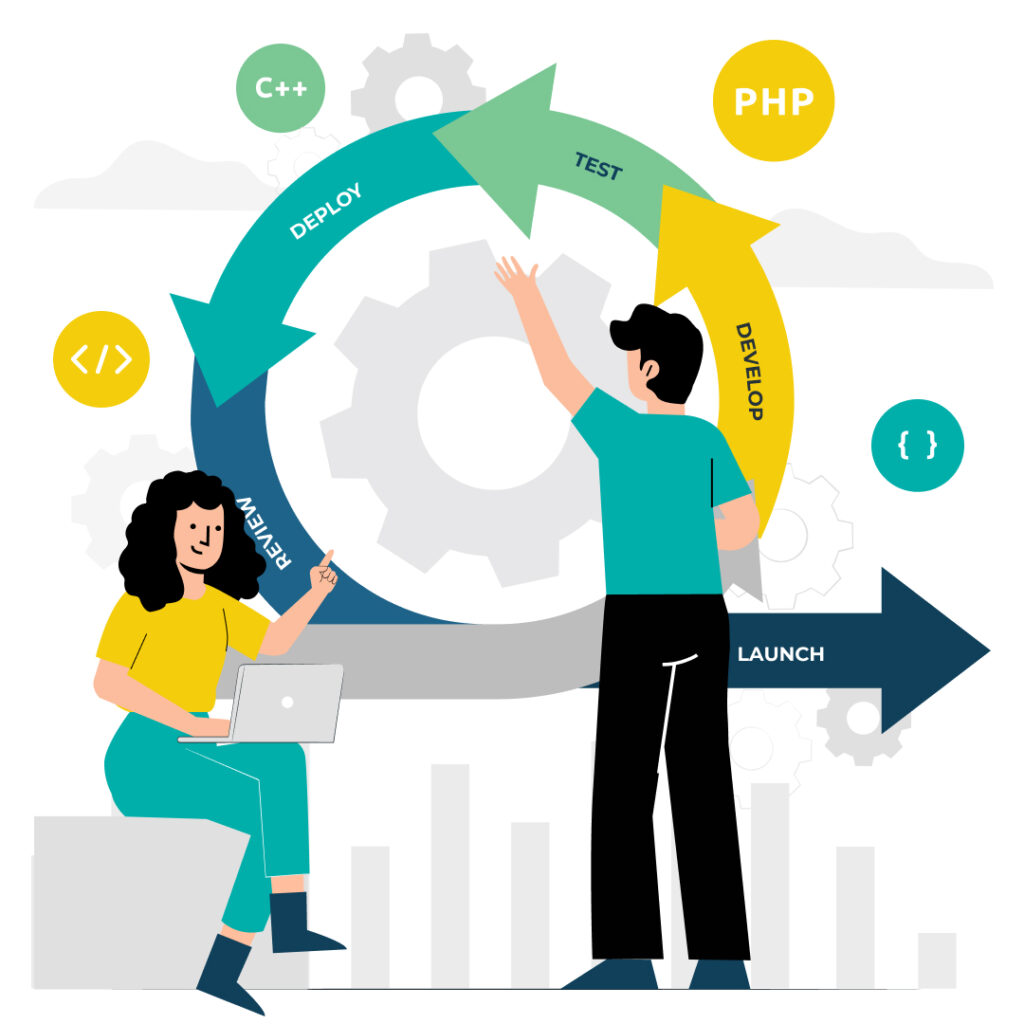Introduction
The Intersection of AI, Machine Learning, and Data Privacy
The digital age has ushered in an era where artificial intelligence (AI) and machine learning (ML) are at the forefront of technological advancement. These innovations promise to revolutionise industries, enhance productivity, and provide solutions to some of the world’s most pressing problems. However, as we integrate AI and ML into our daily lives, we face significant challenges, particularly in terms of data privacy.
Importance of Data Privacy in Modern Technology
Why is data privacy so crucial in today’s tech-driven world? Imagine for a moment that every piece of personal information you share online is a thread in a vast, interconnected web. These threads, when woven together by AI and ML technologies, can create an incredibly detailed and intimate picture of who you are—your habits, preferences, even your innermost thoughts. This power is both a boon and a bane.
On one hand, AI and ML can use this data to provide personalised experiences, improve services, and even predict and mitigate problems before they occur. On the other hand, the potential for misuse is immense. Without stringent data privacy measures, your personal information can be exploited, leading to issues such as identity theft, discrimination, and loss of autonomy. Ensuring data privacy is not just a legal necessity but a moral imperative to protect individuals’ rights and freedoms.
Overview of AI and Machine Learning Applications
Now, let’s take a closer look at how AI and machine learning are being utilised across various sectors. From healthcare to finance, and from entertainment to retail, these technologies are reshaping the landscape.
In healthcare, AI algorithms are being used to predict disease outbreaks, customise treatment plans, and even assist in complex surgeries. The financial sector leverages ML to detect fraudulent activities, assess credit risks, and provide personalised banking services. In the realm of entertainment, AI helps recommend movies and music based on your preferences, creating a more engaging user experience. Retailers use machine learning to optimise supply chains, manage inventories, and tailor marketing strategies to individual customers.
However, each of these applications involves the collection, analysis, and storage of vast amounts of personal data. As such, the challenge lies in harnessing the power of AI and ML while ensuring that data privacy is not compromised. This intersection of technology and privacy is where we must focus our efforts to create a balanced and secure digital environment.
How AI and Machine Learning Use Personal Data
Artificial intelligence and machine learning are powerful tools that require vast amounts of data to function effectively. To fully grasp the implications of data privacy in this context, it’s essential to understand how these technologies collect, process, and analyse personal data. This section will delve into the specific methods AI and ML use to handle personal information.
Data Collection Methods in AI and Machine Learning
Types of Data Collected
When we talk about data collection in AI and machine learning, it’s important to recognise the variety of data types involved. These can be broadly classified into three categories: structured data, unstructured data, and semi-structured data.
- Structured Data: This includes information that is highly organised and easily searchable in databases, such as names, addresses, and financial transactions. Structured data is often used in machine learning algorithms because it is straightforward to process and analyse.
- Unstructured Data: This type of data is not organised in a pre-defined manner. Examples include text files, social media posts, images, and videos. Unstructured data is abundant and holds a wealth of information, but it is more challenging to analyse due to its lack of organisation.
- Semi-Structured Data: This type of data lies somewhere between structured and unstructured data. It does not conform to a strict format but contains tags or markers to separate different elements. Examples include emails, XML files, and JSON documents.
Sources of Personal Data in AI Systems
AI and machine learning systems draw personal data from a myriad of sources. These sources are as diverse as the applications of the technologies themselves:
- Online Activity: Every action you take online—browsing websites, interacting on social media, making purchases—is a potential source of data. This includes clicks, likes, shares, and even the time you spend on particular pages.
- Mobile Devices: Smartphones and tablets are rich data sources, continuously collecting information about your location, app usage, and communication patterns.
- IoT Devices: Internet of Things (IoT) devices, such as smart home gadgets, wearables, and connected cars, gather data about your daily habits, health metrics, and movement patterns.
- Public Records: Government databases, public profiles, and other accessible records contribute to the pool of data available for AI and machine learning models.
Data Processing and Analysis
Once the data is collected, the next crucial step is processing and analysis. This phase transforms raw data into valuable insights and actionable information.
Techniques for Data Processing in AI
Data processing in AI involves several sophisticated techniques designed to handle large volumes of information efficiently:
- Data Cleaning: This step involves removing inaccuracies, inconsistencies, and duplicate entries from the data set to ensure the quality and reliability of the analysis.
- Data Transformation: Raw data is often transformed into a format suitable for analysis. This can involve normalisation, standardisation, and other methods to prepare the data for model training.
- Data Integration: Combining data from various sources to create a comprehensive dataset is essential for accurate analysis. This process ensures that all relevant information is considered, providing a holistic view.
How Machine Learning Models Utilise Personal Data
Machine learning models use personal data to learn, predict, and make decisions. Here’s how they typically utilise this information:
- Training the Model: During the training phase, the model is exposed to historical data, learning patterns and relationships within the dataset. For example, a model might learn to recognise patterns in customer purchase behaviour to predict future buying trends.
- Validation and Testing: After training, the model is validated and tested using separate data sets to ensure its accuracy and reliability. This step helps fine-tune the model and prevent overfitting, where the model performs well on training data but poorly on new data.
- Making Predictions: Once trained and validated, the model can make predictions or decisions based on new, incoming data. For instance, an AI system might analyse real-time data to detect fraudulent transactions or recommend personalised content to users.
In this intricate dance of data collection, processing, and analysis, ensuring data privacy becomes a paramount concern. As we progress, we will explore the unique privacy concerns specific to AI-driven applications and the techniques available to safeguard personal information in these advanced systems.
Privacy Concerns Specific to AI-Driven Applications
As AI and machine learning technologies become more embedded in various facets of our lives, the potential risks and ethical implications associated with their use cannot be overlooked. This section will explore the privacy concerns that are uniquely tied to AI-driven applications, focusing on the risks of data misuse and the broader ethical implications.
Risks of Data Misuse
Unintended Bias in AI Models
One of the most significant risks associated with AI and machine learning is the potential for unintended bias in models. Bias can creep into AI systems in several ways:
- Training Data: If the data used to train AI models is biased or unrepresentative, the resulting predictions and decisions will also be biased. For example, if a facial recognition system is primarily trained on images of individuals from a particular demographic, it may perform poorly when identifying individuals from other demographics, leading to inaccuracies and unfair treatment.
- Algorithm Design: The algorithms themselves can introduce bias, depending on how they are designed and implemented. Certain design choices may inadvertently favour one group over another, perpetuating existing inequalities.
- Human Influence: Bias can also stem from the human programmers and engineers who develop and fine-tune these systems. Their unconscious biases and assumptions can influence how the models are built and applied.
The consequences of unintended bias are far-reaching, potentially leading to discrimination in areas such as hiring, lending, law enforcement, and healthcare. Ensuring fairness and transparency in AI models is crucial to prevent such outcomes and protect individuals’ rights.
Potential for Data Breaches
Another critical concern is the potential for data breaches. AI and machine learning systems often handle vast amounts of sensitive personal data, making them attractive targets for cybercriminals. The risks include:
- Unauthorized Access: Hackers may gain unauthorized access to AI systems, stealing or manipulating personal data. This can lead to identity theft, financial fraud, and other malicious activities.
- Data Leakage: Even without direct attacks, data can inadvertently leak through insecure data storage and transmission practices. Ensuring robust encryption and secure data handling protocols is essential to mitigate this risk.
- Internal Threats: Insiders, such as employees with access to sensitive data, can also pose a threat. Whether through negligence or malicious intent, they can compromise data privacy, leading to significant harm.
Mitigating the risk of data breaches requires a comprehensive approach, including strong cybersecurity measures, regular audits, and employee training to ensure data privacy is maintained at all times.
Ethical Implications
AI Decision-Making and Privacy
AI systems are increasingly being used to make decisions that impact individuals’ lives. These decisions can range from loan approvals and job screening to legal judgments and medical diagnoses. The ethical implications of AI decision-making include:
- Lack of Transparency: AI models, especially those based on deep learning, are often seen as “black boxes,” making it difficult to understand how they arrive at specific decisions. This lack of transparency can lead to mistrust and raise questions about accountability.
- Informed Consent: For AI to use personal data ethically, individuals must provide informed consent. However, the complexity of AI systems and the way data is used can make it challenging for people to fully understand what they are consenting to.
- Autonomy and Control: AI-driven decisions can sometimes undermine personal autonomy. For example, automated systems might make choices on behalf of individuals without their input, potentially leading to outcomes that do not align with their preferences or best interests.
Ensuring ethical AI decision-making involves promoting transparency, obtaining clear and informed consent, and maintaining human oversight to safeguard individuals’ rights and interests.
Surveillance and Personal Freedom
The proliferation of AI-powered surveillance technologies presents significant ethical challenges, particularly concerning personal freedom and privacy:
- Pervasive Monitoring: AI technologies enable pervasive monitoring through facial recognition, location tracking, and other methods. This constant surveillance can lead to a sense of being watched, eroding personal freedom and privacy.
- Misuse of Surveillance Data: The data collected through surveillance can be misused for purposes beyond its original intent, such as profiling, discrimination, and social control. The potential for abuse is particularly high in authoritarian regimes, where surveillance can be used to suppress dissent and monitor citizens.
- Chilling Effect: The awareness of being monitored can create a chilling effect, where individuals alter their behaviour due to fear of surveillance. This can stifle free expression, creativity, and the open exchange of ideas.
Balancing the benefits of AI-driven surveillance with the need to protect personal freedom requires robust legal frameworks, ethical guidelines, and public discourse to ensure these technologies are used responsibly and transparently.
Techniques for Ensuring Data Privacy in AI and ML Models
Ensuring data privacy in AI and machine learning models is paramount in today’s digital age. Given the vast amounts of personal data these systems process, it is essential to implement robust privacy measures. This section explores various techniques that can safeguard personal data, including data anonymisation and encryption, privacy-preserving machine learning, and robust access controls.
Data Anonymisation and Encryption
Methods of Anonymising Data
Anonymisation is the process of removing personally identifiable information from data sets, so the individuals whom the data describe remain anonymous. There are several effective methods for anonymising data:
- Data Masking: This technique involves altering the original data in a way that obscures the personal details while maintaining the data’s usability. For example, replacing actual names with pseudonyms or randomised strings.
- Generalisation: This method reduces the precision of the data to a level that makes re-identification difficult. For instance, instead of storing exact ages, data can be grouped into age ranges.
- Data Perturbation: This involves adding noise to the data, which means slightly altering the data values to prevent identification while retaining the overall data patterns.
- Aggregation: Combining data from multiple sources and summarising it can also help protect individual identities. For example, reporting average salary figures for a department rather than individual salaries.
Each method has its strengths and limitations, and often a combination of these techniques is used to achieve effective anonymisation.
Importance of Encryption in Data Security
Encryption is a cornerstone of data security, transforming data into a format that is unreadable without the appropriate decryption key. This ensures that even if data is intercepted or accessed without authorization, it remains unintelligible. The importance of encryption in data security cannot be overstated:
- Protection of Sensitive Data: Encryption ensures that sensitive information such as personal identifiers, financial details, and health records remain secure from unauthorized access.
- Compliance with Regulations: Many data protection regulations, such as GDPR and CCPA, mandate the use of encryption to protect personal data. Compliance helps organizations avoid legal repercussions and maintain trust with their users.
- Data Integrity: Encryption helps maintain data integrity by ensuring that the data has not been tampered with during transmission or storage. This is crucial for maintaining the reliability and accuracy of AI and ML models.
Privacy-Preserving Machine Learning
Federated Learning
Federated learning is an innovative approach that allows machine learning models to be trained across multiple devices or servers holding local data samples, without exchanging them. This method significantly enhances data privacy:
- Decentralized Data Processing: By keeping data localized on individual devices, federated learning minimizes the risk of data breaches and unauthorized access that could occur during data transmission to a central server.
- Improved User Privacy: Users’ personal data never leaves their devices, reducing the potential for misuse and ensuring compliance with stringent data privacy regulations.
- Collaborative Learning: Multiple entities can collaborate to train a model without sharing their actual data, fostering innovation while maintaining strict data privacy standards.
Differential Privacy
Differential privacy is a technique designed to provide insights from data sets while protecting individual privacy. It adds controlled noise to the data or to the queries made against the data, ensuring that the privacy of individuals is preserved:
- Quantifiable Privacy Guarantees: Differential privacy provides a mathematical framework to quantify and control the privacy loss, giving clear assurances about the level of privacy protection.
- Resilience to Re-identification: By adding noise to the data, differential privacy makes it significantly harder for adversaries to re-identify individuals from the data set.
- Scalable to Large Data Sets: Differential privacy techniques can be applied to large-scale data sets, making them suitable for AI and ML applications that require extensive data analysis.
Robust Access Controls
Role-Based Access Control (RBAC)
Role-Based Access Control (RBAC) is a method for regulating access to data based on the roles of individual users within an organization. RBAC ensures that only authorized individuals have access to certain data, thereby enhancing data security:
- Defined Roles and Permissions: Access rights are assigned to specific roles rather than individuals. Users are then assigned roles based on their job functions, ensuring they only have access to the data necessary for their role.
- Simplified Management: RBAC simplifies the management of user permissions, particularly in large organizations, by centralizing the assignment and modification of access rights.
- Minimized Risk of Data Exposure: By restricting access based on roles, RBAC reduces the risk of unauthorized access and potential data breaches.
Principle of Least Privilege
The principle of least privilege (PoLP) is a security concept that ensures users have the minimum levels of access—or permissions—needed to perform their job functions. This principle is crucial for maintaining data privacy:
- Limited Access: Users are granted only the access necessary to complete their tasks, reducing the risk of accidental or intentional data breaches.
- Enhanced Security: By minimizing the number of users with high-level access, PoLP reduces the attack surface, making it harder for malicious actors to exploit privileged accounts.
- Compliance and Accountability: Implementing PoLP helps organizations comply with data privacy regulations and ensures accountability by limiting the number of individuals who can access sensitive data.
Regulatory Considerations for AI and Machine Learning
As AI and machine learning continue to evolve, regulatory considerations become increasingly critical. Ensuring compliance with data privacy laws is essential for organisations that deploy these technologies. This section explores global data privacy laws and compliance strategies for AI developers.
Global Data Privacy Laws
General Data Protection Regulation (GDPR)
The General Data Protection Regulation (GDPR) is one of the most comprehensive and influential data privacy laws globally. Enforced by the European Union, it sets strict guidelines on how personal data should be collected, stored, and processed. Key aspects of GDPR include:
- Consent: Organisations must obtain explicit consent from individuals before collecting or processing their personal data. This consent must be informed and revocable at any time.
- Data Minimisation: Only the minimum amount of personal data necessary for the specified purpose should be collected and processed.
- Right to Access: Individuals have the right to access their data and understand how it is being used. They can request copies of their data and inquire about the data processing activities.
- Right to Erasure: Also known as the “right to be forgotten,” this provision allows individuals to request the deletion of their data under certain circumstances, such as when the data is no longer needed for the original purpose.
- Data Portability: Individuals can request their data in a structured, commonly used format, enabling them to transfer it to another data controller without hindrance.
- Data Breach Notification: Organisations must promptly notify both the relevant authorities and affected individuals in the event of a data breach.
GDPR applies to any organisation that processes the personal data of EU residents, regardless of where the organisation is located, making it a critical consideration for AI and ML developers worldwide.
California Consumer Privacy Act (CCPA)
The California Consumer Privacy Act (CCPA) is another significant data privacy law, applicable to businesses operating in California or dealing with the personal data of California residents. Key provisions of CCPA include:
- Consumer Rights: The CCPA grants consumers the right to know what personal data is being collected, how it is used, and with whom it is shared. They also have the right to access and delete their data.
- Opt-Out Option: Consumers can opt-out of the sale of their personal data to third parties. Businesses must provide a clear and accessible opt-out mechanism on their websites.
- Non-Discrimination: Businesses cannot discriminate against consumers who exercise their privacy rights under the CCPA. This means that services or prices cannot be withheld or altered based on a consumer’s privacy choices.
- Data Protection: The CCPA mandates businesses to implement reasonable security measures to protect personal data from breaches and unauthorized access.
Compliance with CCPA requires businesses to be transparent about their data practices and to honour consumer rights diligently.
Compliance Strategies for AI Developers
Implementing Privacy by Design
Privacy by Design is a proactive approach that embeds data privacy into the development process of AI and ML systems from the outset. This strategy involves:
- Data Minimisation: Limiting the collection of personal data to what is strictly necessary for the functionality of the AI system. Avoid collecting extraneous data that may pose additional privacy risks.
- Pseudonymisation and Anonymisation: Employing techniques to de-identify personal data, reducing the risk of re-identification. Pseudonymisation replaces identifying information with pseudonyms, while anonymisation removes identifiers entirely.
- User Consent and Transparency: Ensuring that users are informed about data collection practices and obtain their explicit consent. Transparency about how data will be used, stored, and shared builds trust and compliance with regulations.
- Secure Data Handling: Implementing robust encryption and access control measures to protect data during storage and transmission. Regularly updating security protocols to address emerging threats.
Regular Audits and Assessments
Conducting regular audits and assessments is crucial to ensure ongoing compliance with data privacy regulations. This involves:
- Internal Audits: Periodically reviewing data processing activities, security measures, and compliance practices to identify and rectify potential issues.
- Third-Party Assessments: Engaging independent auditors to conduct thorough assessments of data privacy practices. This provides an unbiased evaluation of compliance and highlights areas for improvement.
- Impact Assessments: Performing Data Protection Impact Assessments (DPIAs) to evaluate the privacy risks associated with new AI projects or significant changes to existing systems. DPIAs help identify potential privacy issues early and implement mitigating measures.
- Training and Awareness: Educating employees about data privacy regulations, best practices, and their roles in maintaining compliance. Regular training sessions ensure that staff are aware of the latest requirements and know how to handle personal data responsibly.
By implementing these compliance strategies, AI developers can navigate the complex regulatory landscape and build systems that respect user privacy while harnessing the power of AI and machine learning.
Examples of Privacy-Conscious AI Applications
Privacy-conscious AI applications demonstrate how robust data privacy measures can be integrated into various domains. By examining specific case studies in healthcare, financial services, and social media, we can understand the practical implementation of privacy-preserving techniques in AI.
Case Study: Privacy-Focused AI in Healthcare
Data Privacy Measures in Patient Data Management
In healthcare, managing patient data with utmost privacy is critical. Healthcare providers are increasingly adopting AI to enhance patient care while ensuring data privacy through several measures:
- Data Encryption: Patient records and medical histories are encrypted to prevent unauthorized access during storage and transmission. This ensures that sensitive information remains confidential.
- Access Controls: Strict access controls are implemented to ensure that only authorized personnel can access patient data. Role-based access control (RBAC) limits data access based on job functions, reducing the risk of data breaches.
- Anonymisation: Personal identifiers are removed from patient data before it is used for research or AI model training. This anonymisation process protects patient identities while allowing valuable insights to be gleaned from the data.
AI-Driven Diagnostics with Privacy in Mind
AI-driven diagnostics are revolutionising healthcare by providing accurate and timely diagnoses. Privacy-focused AI applications in diagnostics include:
- Federated Learning: Federated learning enables the training of AI models on local devices, such as hospital servers, without sharing patient data externally. This method ensures that patient data remains within the healthcare facility while contributing to the improvement of diagnostic models.
- Differential Privacy: AI algorithms incorporate differential privacy techniques to add noise to the data, protecting patient privacy while still allowing the extraction of meaningful patterns for diagnosis.
- Secure Data Sharing: When collaboration between healthcare providers is necessary, secure data sharing protocols are used. Encrypted channels and strict data sharing agreements ensure that patient data is protected during inter-organizational exchanges.
Privacy in AI-Powered Financial Services
Securing Personal Financial Information
The financial sector relies heavily on AI to provide personalized services and improve security. Ensuring the privacy of personal financial information is paramount:
- Encryption and Tokenisation: Financial data, such as transaction details and account information, is encrypted and tokenized. Tokenisation replaces sensitive data with unique identifiers that can only be mapped back to the original data through a secure database, minimizing the risk of exposure.
- Privacy by Design: Financial institutions implement privacy by design principles, embedding privacy features into AI systems from the ground up. This includes minimizing data collection, ensuring data accuracy, and maintaining transparency with customers.
- Real-Time Monitoring: AI systems continuously monitor financial transactions for unusual activities. Data privacy is maintained by using secure channels and protocols to detect and prevent fraud without compromising customer information.
AI in Fraud Detection and Prevention
AI plays a crucial role in detecting and preventing financial fraud, with privacy measures integrated into these applications:
- Anomaly Detection: AI models identify anomalies in transaction patterns, flagging potential fraudulent activities. These models are trained on anonymised data to protect individual identities.
- Behavioral Analysis: Advanced AI systems analyze user behavior to detect inconsistencies that may indicate fraud. Privacy-preserving techniques ensure that these analyses do not compromise personal data.
- Automated Response Systems: AI-driven automated response systems handle potential fraud cases swiftly while adhering to privacy protocols. Secure communication channels and encrypted data handling are standard practices.
AI for Enhanced Privacy in Social Media Platforms
Balancing Personalisation and Privacy
Social media platforms leverage AI to personalise user experiences while prioritising data privacy:
- Data Minimisation: Platforms collect only the data necessary to personalise content, reducing the amount of personal information stored. Users are informed about the data collection process and given the option to opt out.
- Privacy Settings: Users have control over their privacy settings, allowing them to manage who can see their content and what data can be shared. AI algorithms respect these settings, ensuring that personal data is not exposed beyond the user’s preferences.
- Secure Algorithms: AI algorithms on social media platforms are designed to process data securely, using encryption and other privacy-preserving techniques to protect user information.
User Control over Data Sharing
Empowering users with control over their data is a critical aspect of privacy-conscious AI in social media:
- Transparency: Social media platforms provide transparency reports that detail how user data is collected, processed, and shared. This transparency builds trust and allows users to make informed decisions.
- Data Portability: Users can export their data in a portable format, giving them the freedom to move their information to other services if they choose. This portability is facilitated through secure, encrypted processes.
- Consent Management: AI-driven consent management systems ensure that users are aware of data sharing practices and can easily give or revoke consent. These systems track consent history, providing an audit trail that reinforces accountability.
Conclusion: Data Privacy in the Age of AI and Machine Learning
As we advance into an era where AI and machine learning play increasingly pivotal roles in our daily lives, the importance of data privacy cannot be overstated. The integration of AI into various sectors—healthcare, finance, social media, and beyond—brings both tremendous benefits and significant privacy challenges. It is crucial for organisations and developers to prioritize data privacy at every stage of AI implementation to build trust and comply with stringent regulatory standards.
Balancing Innovation with Privacy
AI and machine learning technologies have the potential to revolutionise industries by improving efficiency, accuracy, and personalisation. However, these advancements come with the responsibility to protect personal data from misuse, breaches, and unethical practices. By adopting privacy-preserving techniques such as data anonymisation, encryption, federated learning, and differential privacy, organisations can innovate responsibly while safeguarding user data.
The Role of Regulations
Global data privacy laws, including GDPR and CCPA, set a high bar for data protection, requiring organisations to implement comprehensive privacy measures. Compliance with these regulations is not just a legal obligation but also a commitment to ethical AI practices. Regular audits, impact assessments, and adherence to privacy by design principles ensure that AI systems respect user privacy from development through deployment.
Building Trust Through Transparency
Transparency and user control are fundamental to building trust in AI applications. Users must be informed about data collection practices and given the ability to manage their privacy settings. Organisations should provide clear, accessible information about how data is used and offer mechanisms for users to opt-out or delete their data. Empowering users with control over their personal information fosters trust and enhances the user experience.
Moving Forward
The future of AI and machine learning will undoubtedly bring further advancements and new challenges in data privacy. It is imperative that developers, policymakers, and stakeholders collaborate to establish robust privacy frameworks that adapt to emerging technologies. By prioritising data privacy, we can harness the full potential of AI while protecting the fundamental rights and freedoms of individuals.
In conclusion, data privacy in the age of AI and machine learning is a complex but essential consideration. By implementing strong privacy measures, complying with regulations, and fostering transparency, we can create a future where AI technologies enhance our lives without compromising our privacy. The journey towards privacy-conscious AI is ongoing, but with continued effort and vigilance, we can achieve a balanced and ethical integration of AI into our world.












